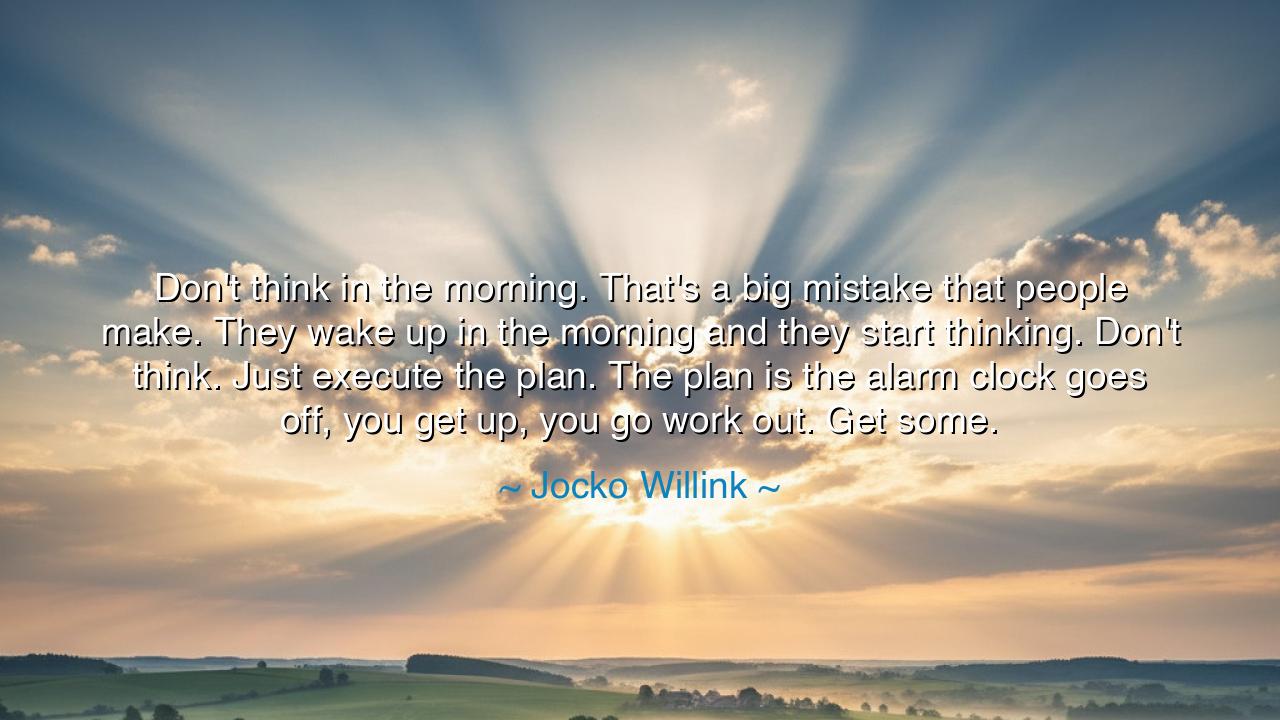
Don't think in the morning. That's a big mistake that people
Don't think in the morning. That's a big mistake that people make. They wake up in the morning and they start thinking. Don't think. Just execute the plan. The plan is the alarm clock goes off, you get up, you go work out. Get some.






Jocko Willink, the warrior of discipline, once spoke with clarity and steel: “Don’t think in the morning. That’s a big mistake that people make. They wake up in the morning and they start thinking. Don’t think. Just execute the plan. The plan is the alarm clock goes off, you get up, you go work out. Get some.” These words are not soft comforts, but a battle cry against hesitation, against the weakness of the mind when it wakes from slumber. They remind us that victory is not won in moments of debate, but in swift, unwavering action.
The morning has always been sacred. It is the hour when the world is reborn, when the sun breaks the horizon and life begins anew. Yet, it is also the hour when the body resists, when the mind whispers excuses, when the spirit seeks to linger in comfort. To awaken and begin to think is to invite delay, and delay is the thief of resolve. Jocko teaches us that in the moment of awakening, thought must be replaced with execution, for the body already knows the path: rise, move, fight, conquer.
This wisdom is not new, but as old as the soldiers of Sparta and the monks of the East. The Spartans did not deliberate whether to rise for training; their discipline was their breath, their mornings a rhythm of obedience to the code of warriors. Likewise, the Zen monk does not linger upon whether to meditate at dawn. The bell rings, the monk sits, breath follows breath. In both the battlefield and the monastery, the law is the same: do not negotiate with yourself in the fragile hour of dawn. Execution over thought.
Consider the story of Admiral William Halsey in the Second World War. When confronted with sudden decisions at sea, he did not paralyze himself with endless thought. He acted with the plans already forged in discipline and preparation. Had he waited, hesitation would have cost lives. Just as in war, so too in daily life: in the morning, if you wait to negotiate with yourself, the battle is already lost. The enemy is not outside, but within, whispering: “Stay in bed. Rest a little longer. You can begin later.” That enemy must be slain by execution.
The essence of Jocko’s command is this: preparation is thought, but the dawn is for action. At night, you lay your clothes ready, you set the alarm, you choose the course. But in the morning, when the alarm cries out, there is no more thinking, no debate, no bargaining. There is only the path: rise, step forward, and get some. In this way, discipline becomes freedom, for you are no longer enslaved by the weakness of choice.
The lesson is eternal: if you wish to achieve greatness, do not leave the morning to chance. Let your body obey the plan you have already written. In business, in study, in training, in every pursuit, make your decisions beforehand — then in the hour of action, execute without hesitation. For the world is moved not by those who sit and ponder endlessly, but by those who rise with purpose and strike while others are still thinking.
Practical action follows clearly: each night, write your plan for the morning. Place your tools ready — whether it is running shoes, books, or the instruments of your craft. When the alarm sounds, do not converse with your doubts. Rise and move at once. Over time, this rhythm will carve into your soul the strength of discipline, and you will become like iron: unmoved by temptation, unbroken by fatigue.
Thus, hear the words of Jocko Willink not merely as advice, but as the command of a general to his troops: do not think in the morning. Thought is for strategy, but morning is for war. And in that daily war against sloth, hesitation, and weakness, there can be no hesitation. Rise, obey, and act. For he who conquers the morning, conquers the day; and he who conquers the day, conquers life.






AAdministratorAdministrator
Welcome, honored guests. Please leave a comment, we will respond soon